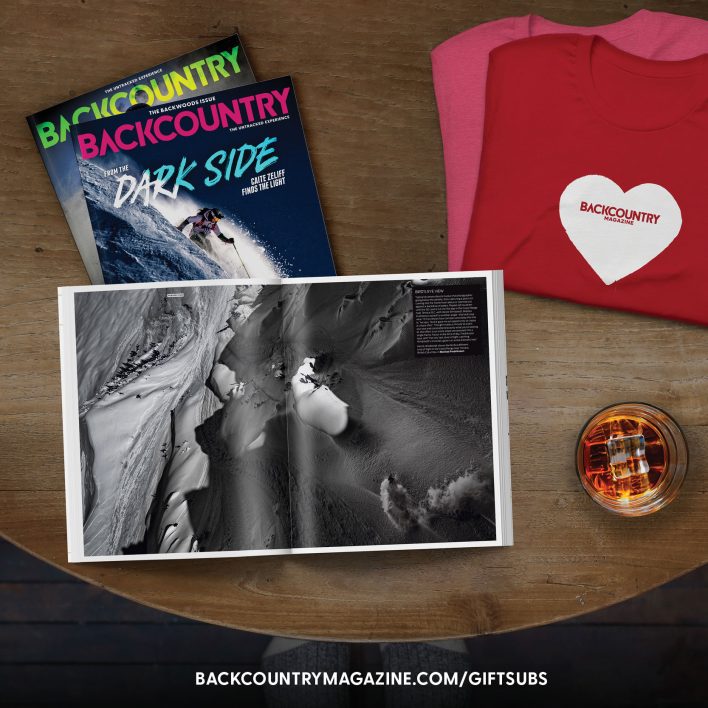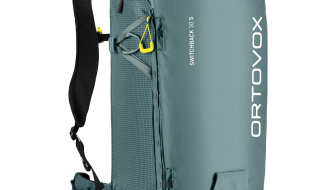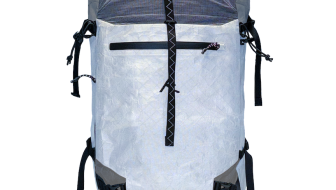This past April, a team of skiers and educators from around the U.S. set out on a trip to Iceland with the intention of using their travel experiences as a teaching tool for students at the Bend, Ore. Waldorf School. The educational journey, dubbed Down to Earth, was developed by teacher Michaela Precourt along with seven other team members, including freeskier and environmental advocate Lexi DuPont, as a way to connect the passion of the expedition members for skiing with on-the-ground environmentalism, community engagement and educational outreach for students back in the states. With recorded lessons on earth systems and climate change along with a live broadcast of the team from their sailboat direct to the classroom, students were able to learn about Icelandic ecology, food systems and other classroom topics. To learn more about the Down To Earth expedition series, we caught up with Lexi DuPont to hear about the pilot adventure to Iceland and what future expeditions to Greenland, Norway, Baffin Island and the Northwest Passage may entail.

Lexi Dupont makes human powered turns from summit to sea. [Photo] Gabe Rogel
Lexi DuPont: It’s a five-year plan, so we can really get into the hearts and minds of these students. We want them to be able to track the changing arctic landscape as they go through school. We’re hoping that they really form a connection to these landscapes and that they can start to see change over time.
BCM: How many schools are involved in this program?
LD: We had 47 different elementary schools that we were working with for this first project. We would record lessons and when we got back to service [while traveling] we were able to upload lessons and then the kids were able to view them through the weekend. Their homework was to come to school on Monday with questions, and we would do a live Skype with the classroom. Different classrooms had different subjects to learn about, from climate change to tides and waterways to astrology and botany. And then on our end, because of that, I learned so much going to talk with local farmers and fishermen and the local women in the towns who were trying to start their own CSAs. So we were learning on this adventure as well. But skiing was that common thread; it was what was bringing us to these places.
BCM: What was the skiing like while you were there?
LD: We skied every day, thanks to the ship that was taking us around to the coves and fjords we ended up skiing. And we were also participating in the 100-mile diet challenge—eating foods grown within 100 miles of our location. So that forced us to get involved in the community and in their food systems—doing that really engages you as a traveller.
BCM: What prompted this expedition series?
LD: Michaela and I have been in touch for six years trying to put together a trip. I was talking with Gabe Rogel, the photographer, about putting a trip together to the Arctic or Iceland or Greenland, and Michaela was interested in developing a trip that would have an educational focus. So we blended the two together. On top of that, I was on a skintrack up in Revelstoke with Chris Rubens and Mark Abma, and we were chatting about the 100-mile diet challenge. We were talking about how in the ski industry, we are constantly traveling and consuming, and it weighs on your conscience. We call ourselves environmentalists, but we use so many resources to get to where we are going. So we wanted to figure out how we could still live this adventure while still being environmentally conscious.
So we talked about what that would look like, and we found it overwhelming, but Michaela brought all these concepts together with the classrooms and the students. And this trip to Iceland was a pilot to this longer process. We knew that it was going to work its way out and have its own life, so we had to sit back and see what happened and what people would respond to best. What we were left with was this educational mission. Creating a conscious community is now our goal.

Lexi disembarks from her sailboat diggs for another skintrack lap [Photo] Gabe Rogel
LD: We want to continue with the 100-mile diet, because it hits home for all of us in terms of connecting with communities and remaining as sustainable as possible. As for the educational aspect, I am not sure what the subjects are going to be. If we are doing the Northwest Passage, would we talk about astronomy or would we focus more on navigation and climate change? So it will play itself out—which lessons we will be teaching. We need to make sure what we speak to is relevant for each trip. The human-powered element is important and the 100-mile diet is too; past that, we aren’t sure exactly what we might talk about in the future.
BCM: How did you choose what schools/students to partner with?
LD: We have a great relationship with the Waldorf School in Bend Oregon, and that was the school we primarily worked with on this pilot trip. Past that relationship, we are working to cultivate a relationship with Outward Bound. And I just had a meeting with the Rainforest Action Network to get them on board.
BCM: How does skiing play a role is this project?
LD: Skiing is the common thread that brought us all together. It is what resonates with us, and it’s one of the primary reasons why I am so dedicated to helping with environmental causes. I think that without skiing I would still be an environmentalist, but not in the same way. I am able to use my voice in my community, and these issues speak to the greater skiing community, because skiers understand the pressing nature of climate change. Skiing also gets me outside; it gets me interacting with these incredible places. Expeditions teach you so many applicable skills that enrich your lifestyle: group dynamics, teamwork, time management, emotional management. If we were a bunch of scientists on a boat, we wouldn’t be engaging with the community and environment in the same way.
BCM: How did the 100-mile diet work while you were in Iceland?
LD: When you’re in Iceland, you’re on a fault line, so there is a lot of crazy geothermal action. Because of that, there are incredible greenhouses—they are paving the way for greenhouse technology, because you can’t grow much up there. There is also a huge fishing community. There is a lot of collecting mussels and fishing for cod and other fantastic seafood. They also eat a lot of whale and seal and shark, and I wasn’t into that as much. There was a little too much of an emotional connection for me. Other sources of meat are lamb and horse, and then the vegetables are pretty much onions, potatoes and carrots. There are also these crazy biscuits they make in Iceland that we ate while we were backcountry skiing, because no one really wanted to eat fish filets while skinning. So we were just gulping down these biscuits, and we finally asked how many calories was in one of them, and the locals told us that three of them were equal to a Snickers bar. We were eating like 20 a day.
But to be perfectly honest, we had like an 80-percent buy-in with the 100-mile diet, because we ate some Nutella at the end of our trip, which we couldn’t resist. We also wanted to be solely human-powered, but that was not a 100 percent deal either.
We would kayak or standup paddleboard to the beach, and then we used the sailboat to get around. On the way back we lost a lot of wind, though, and the captain had to turn the motor on to get back to the dock, because they had other clients coming in. What that represented for me is that no one is perfect. We are all human, and you have to just do your best. You can put out all of these amazing goals, but the most important thing is that you have an awareness of what you want to achieve, and even if it’s not perfect, it’s still a worthwhile endeavor. And that is what makes this message relatable. We are not all going to be off-the-grid zero impact humans, but we have to initiate change and enable people to do the best they can.










Related posts: